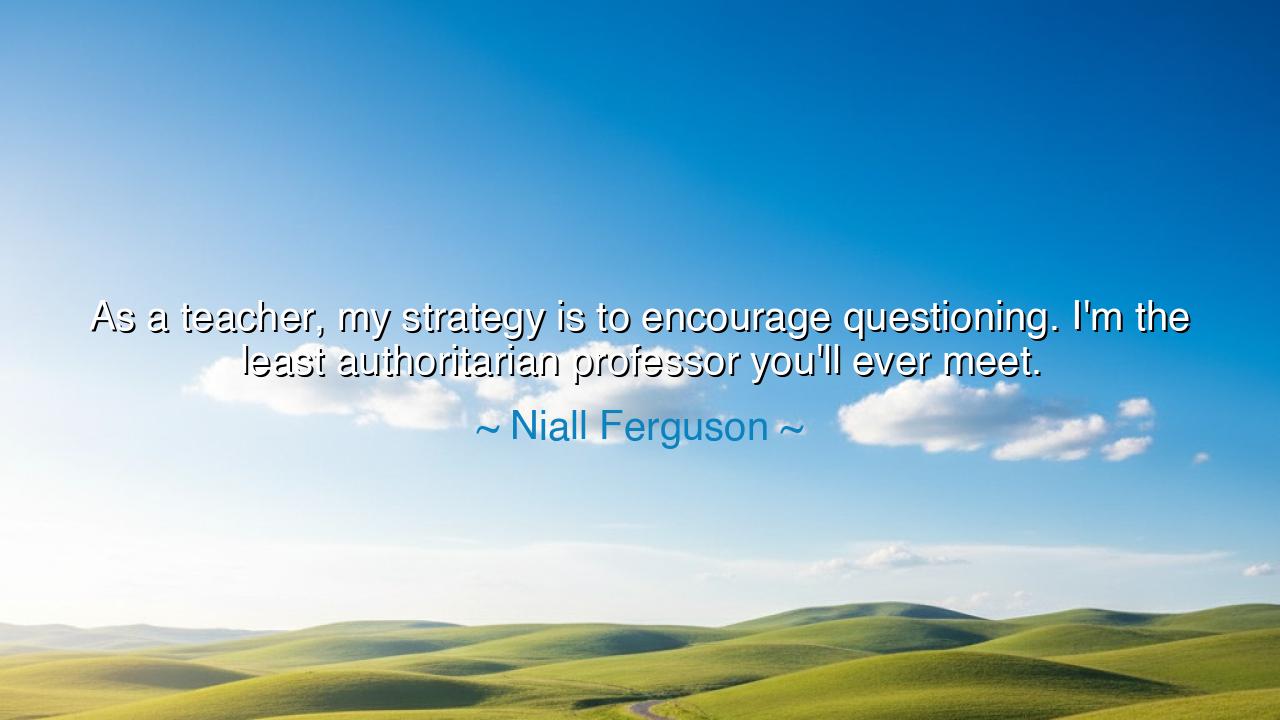
As a teacher, my strategy is to encourage questioning. I'm the
As a teacher, my strategy is to encourage questioning. I'm the least authoritarian professor you'll ever meet.






Hear the words of Niall Ferguson, historian and teacher, who proclaims with humility and boldness: “As a teacher, my strategy is to encourage questioning. I’m the least authoritarian professor you’ll ever meet.” In these words shines the spirit of true education — not the chaining of minds to doctrine, but the freeing of them to wander, to inquire, to doubt, and to discover. For the true teacher is not a tyrant of knowledge, but a guide upon the road, pointing the way while allowing the student to walk with their own steps.
The origin of this teaching lies deep in the traditions of learning itself. From the groves of ancient Athens comes the memory of Socrates, who taught not through lectures heavy with authority, but through questions that opened the soul. He did not demand obedience; he provoked inquiry. And though his city condemned him, his method lived on, shaping philosophy for centuries. Ferguson’s words echo this ancient lineage: that to teach well is to inspire questioning, not to crush it under the weight of dogma.
The meaning of the quote is powerful and emotional. To be the “least authoritarian professor” is to resist the temptation of pride, to renounce the throne of superiority that many teachers claim. It is to trust the student enough to let them wrestle with ideas, to allow them the dignity of arriving at truth themselves. Authority may silence a classroom, but questioning fills it with life. And in that life — in the clash of thought, the friction of ideas — wisdom is born.
Consider the tale of Galileo Galilei, who encouraged questioning when the world demanded silence. He looked at the heavens with his telescope and dared to ask whether the Earth was truly the center of all. The authorities raged, demanding obedience, but Galileo’s questioning reshaped human understanding forever. His story reveals why Ferguson’s path is wise: questioning may cause conflict, but it is the spark that lights the fire of progress. Without it, we remain in darkness.
And yet, there is heroism in such humility. For it is easier to command than to guide, easier to dictate than to encourage. To invite questioning is to invite challenge, to risk being proven wrong, to face the possibility that the student may rise beyond the teacher. But this, too, is greatness — to rejoice not in the preservation of authority, but in the advancement of truth. For the true teacher, like the farmer, does not hoard the seed, but scatters it, knowing the harvest belongs to the future.
The lesson is clear: in our lives, whether we are teachers by profession or simply elders, parents, and guides, we must not demand blind obedience but encourage living inquiry. The child, the student, the seeker — they grow strong not by reciting what they are told, but by questioning, doubting, testing, and discovering. To silence questions is to weaken the spirit; to encourage them is to awaken greatness.
Therefore, take these practical actions: When others ask, do not rush to answer with authority, but return the gift of a deeper question. In your own life, resist the comfort of certainty and cultivate curiosity. If you teach, create spaces where inquiry is honored above obedience. If you lead, do so not by crushing doubt but by showing that doubt is a path toward truth. And above all, do not fear when others question you; see it as proof that you have stirred their minds to life.
So remember Ferguson’s words: “My strategy is to encourage questioning.” Let them echo like a charge across the ages, reminding us that the greatest leaders and teachers are not those who command silence, but those who awaken the voice of inquiry. For questioning is the breath of wisdom, the seed of progress, and the eternal fire by which humanity ascends to greater heights.






AAdministratorAdministrator
Welcome, honored guests. Please leave a comment, we will respond soon